Why now? How viral TikToks, eight Palestinian families and one of Islam's holiest sites brought Israel to the brink of war
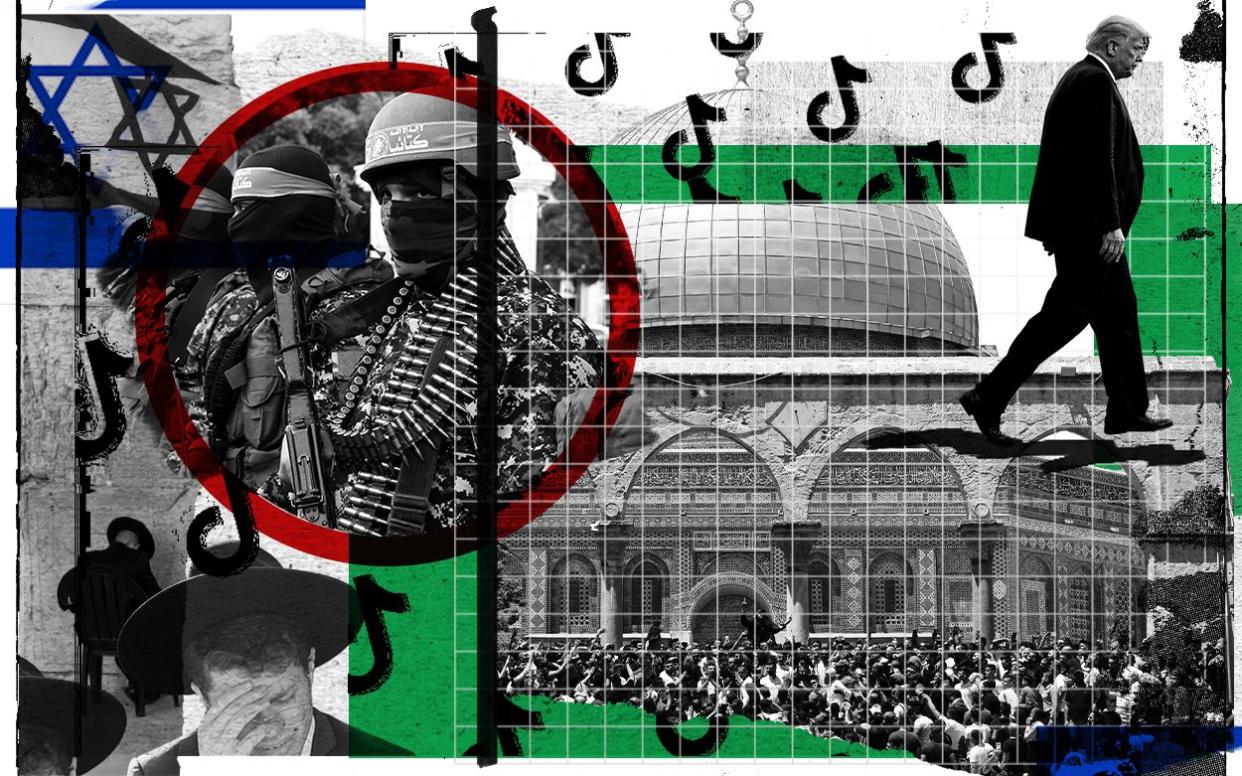
- Oops!Something went wrong.Please try again later.
The past week has seen some of the worst Arab-Israeli violence in years, with rocket salvoes, airstrikes, violent protests and street fighting.
Yet tensions in Israel and the Occupied Territories have been on the rise for months. Here, The Telegraph unpacks how events both big and small have combined to bring the region back to conflict.
A 'local planning dispute' turned nasty
In a land where blood has long been spilled over property rights, the tree-lined streets of East Jerusalem's tiny Sheikh Jarrah district are a case in point. The district is at the centre of a decades-long legal dispute involving Palestinian families who face eviction orders from Jewish settlers.
Originally refugees, the families were rehoused in Sheikh Jarrah in the 1950s as part of a UN-backed offer from Jordan, which at that time controlled East Jerusalem.
Jordan then lost the land during the Six Day Arab-Israeli War in 1967 and since then the families have faced claims from Jewish landowners, who say the land was bought by Jewish associations in the 19th century.
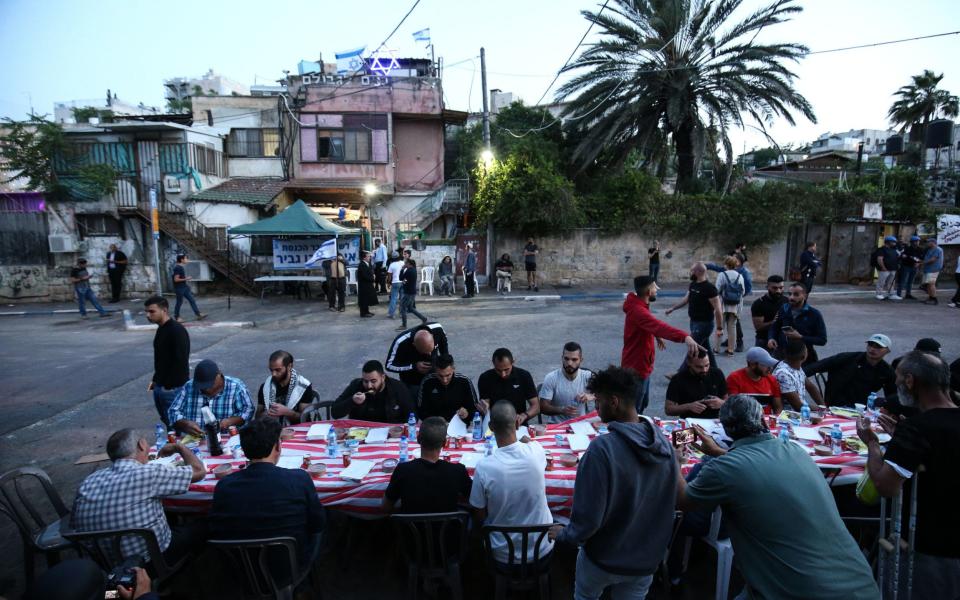
While the current eviction proceedings involve just eight households, many Palestinians see the Sheikh Jarrah dispute as part of an Israeli campaign to banish them from Jerusalem.
The anger over Sheikh Jarrah case is increasingly seen as a microcosm of the pain felt by many over the expansion of Jewish settlements into Palestinian territories.
The district has seen heated demonstrations in recent months, focused partly on a much-anticipated ruling in the case by Israel's Supreme Court. It was due last Monday but has now been postponed for a month amid the ongoing violence.
The Israeli government insists it is just a “real estate dispute between private parties”, but both Washington, the UK and the UN have expressed concern about the evictions.
A holy time and a holy place
The timing of the delicate Supreme Court judgement could not have been worse. Monday was also Jerusalem Day, when Israel celebrates its capture of East Jerusalem in the 1967 Arab-Israeli war. An annual march by Jewish right-wingers to celebrate looked certain to stoke anger.
But it didn't need to.
A few days before on Friday, and again on Monday, Israeli authorities clashed with Muslim worshippers at the famous al-Aqsa mosque in Jerusalem's Old City.
Palestinians and Israeli Arabs had been marking the Muslim Holy month of Ramadan, which began on April 12 and ended last Wednesday.
Traditionally, many then gather after daytime fasting at the promenade around the walls of Jerusalem’s Old City.
This year, however, there were fierce confrontations after police blocked access to the promenade, ostensibly as a crowd control measure.
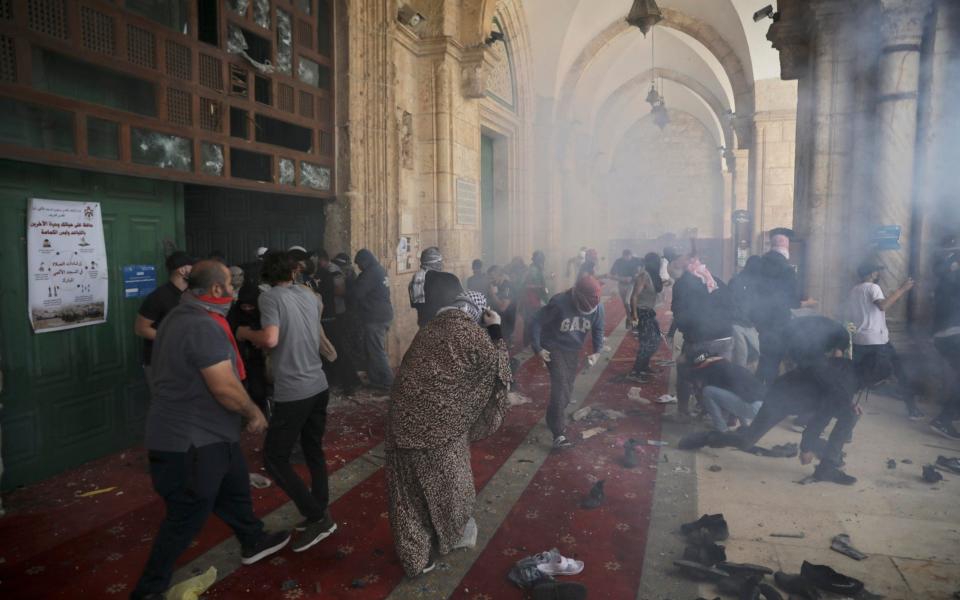
Sheikh Jarrah was on the lips of the many standing up to Israelis during those long nights. The authorities replied with stun grenades and tear gas inside the Al-Aqsa mosque, Islam's third most holy site. Palestinians from the West Bank to Gaza were horrified.
Politics, a dirty business
To understand the toxic atmosphere on the ground, one must appreciate the political mood.
Palestinians should have been looking forward to parliamentary elections next week - the first in the Occupied Territories since 2006, and potentially a chance to give their leadership a long-overdue shake-up.
However, in late April, the Palestinian Authority's president, Mahmoud Abbas, announced that the scheduled May 22 vote would be delayed indefinitely.
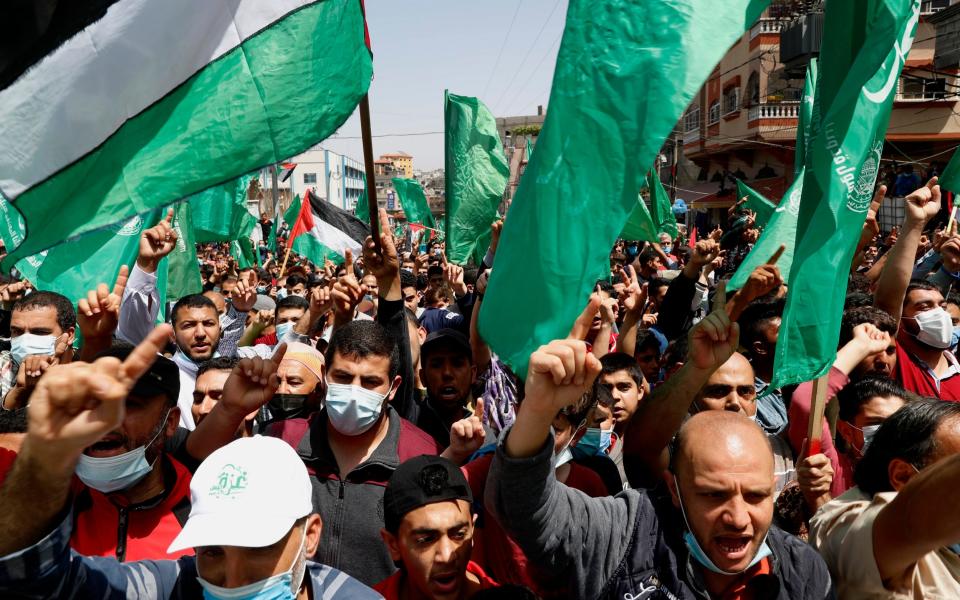
Officially this was because of uncertainties over whether the Israeli government would allow voting in East Jerusalem. But the postponement also allowed Mr Abbas to stop a contest that could have seen him lose votes to rival Fatah splinter parties, and to Hamas, the more radical faction that controls Gaza.
For many younger Palestinians - some of whom have reached their 30s without ever voting - it meant a much-anticipated chance to express their political voice has gone.
Within Israeli politics, meanwhile, the failure of prime minister Benjamin Netanyahu to win a majority in March's elections has forced him to court hard-right religious figures for support.
Among those his Likud Party has reached out to is Itamar Ben Gvir, whose Jewish Power faction won seats in the parliament for the first time. Mr Ben Gvir is notorious for displaying in his living room a picture of Baruch Goldstein, a mass murderer who killed 29 Palestinians in the early 1990s.
This week, Israeli police blamed Mr Ben Gvir for stirring the ongoing Arab-Jewish riots, complaining that whenever police got disturbances under control, he would turn up with fellow hardliners and reignite the trouble.
Despite Mr Ben Gvir’s hardline views – he has called for expulsion of those “not loyal to the state” - Mr Netanyahu reportedly offered him a ministerial position in return for support in a coalition.
The Trump legacy
Feeding the violence is also a growing sense of hopelessness among Palestinians, who fear that international support for their grievances with Israel is waning.
This began with the election of President Donald Trump, who relocated the US embassy from Tel Aviv to Jerusalem - an official recognition of the city as Israel's capital.
That was seen as a symbolic snub to Palestinians, who envisage East Jerusalem as the capital of a future Palestinian state.
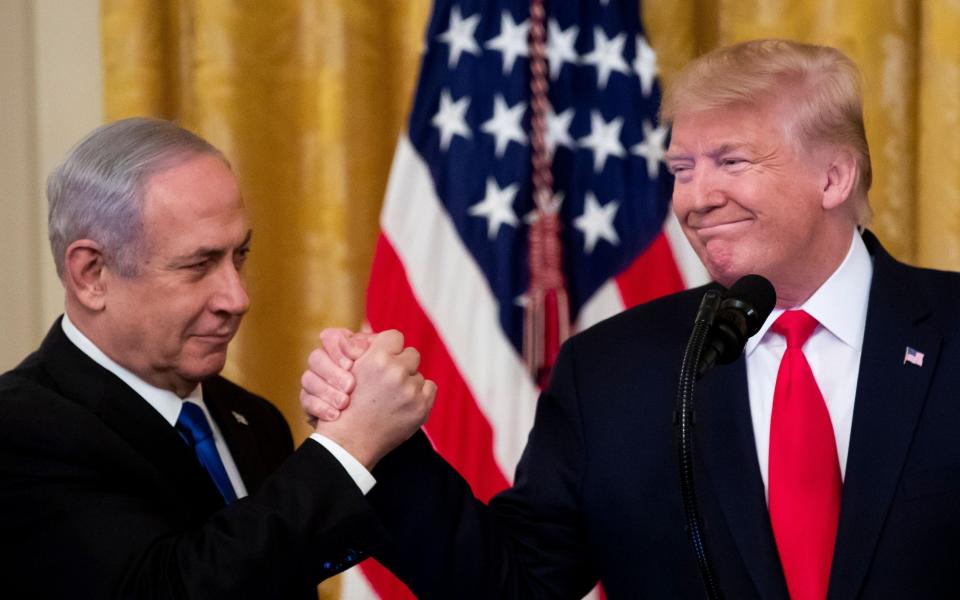
There was further dismay over Mr Trump's 2020 Abraham Accords, in which the UAE, Bahrain, Morocco and Sudan all normalised relations with Israel.
While the accord was partly because those states shared Israel's enmity with Iran, Palestinians saw it as the betraying of a longstanding Arab solidarity over Israel's occupation.
That their erstwhile Arab allies even signed the deal was an indictment of the Palestinians' own political leadership - seen variously as too corrupt, militant and faction-ridden to be players in their own future.
And this is to say nothing of Mr Trump's much-vaunted 'Middle East Peace Plan' that was supposed to solve the intractable conflict between Israel and Palestine for good.
When it finally came, delivered by the president's son-in-law Jared Kushner, it suggested a halt expansion of any new settlement but at the same time gave Israel a green light to annex part of the West Bank in violation of international law. It was rejected by Palestinians out of hand. The two-state solution was, perhaps, more distant than ever.
An unpleasant TikTok craze
The abandonment of the Palestinian cause and the turmoil in Israeli politics also helped stir communal tensions within Israel, some have argued.
While Arab-Israeli tensions frequently escalate into exchanges of missiles and gunfire, petty street hostilities are sometimes the spark.
עכשיו בטיקטוק.
"לתפארת מדינת ישראל" pic.twitter.com/cbYl48uJly— Shlomo Shapira (@Shlomo61) April 15, 2021
One recent case that has fuelled the current violence involved footage of a young Arab man who slapped two Orthodox Jewish boys in the face as they sat on a train. Police said it was part of a "TikTok challenge" organised by Palestinian youngsters during Ramadan to stage filmed attacks on their Jewish counterparts.
Yedidia Epstein, a 15-year-old Jewish teenager who says he was beaten and slapped in an attack near Jerusalem's Damascus Gate, told Israeli media: "There is a competition for likes and views. A video of an Arab slapping an ultra-Orthodox man will get you both."
A TikTok spokesperson said: "Our teams have been working swiftly to remove misinformation, attempts to incite violence, and other content that violates our community guidelines, and will continue to do so."
The TikTok attacks have provoked outrage among Jews, and led to clashes in east Jerusalem three weeks ago between Arab youths and the Jewish ultra-nationalist Lehava group, whose supporters staged a march chanting "Death to Arabs". Communal violence has this week spread across Israel, presenting the authorities with a new domestic threat of sectarian rioting.
Why the first rocket was fired
Trouble at the al-Aqsa mosque helped postpone the much-anticipated Sheikh Jarrah court judgement. But the violence at the holy site was already spreading.
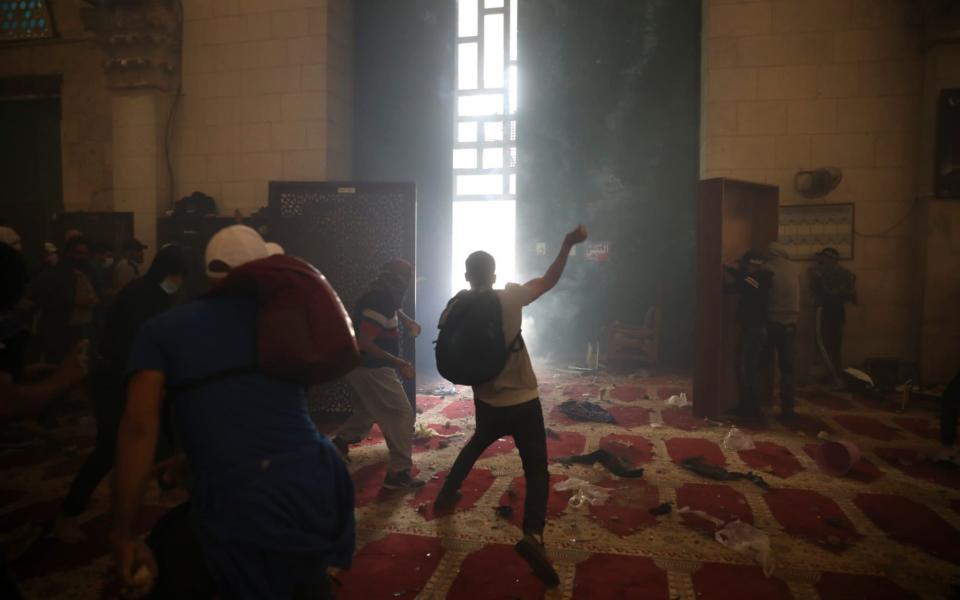
As protests raged around the mosque a confrontation took place between a Jewish motorist and a group of youths, the motorist filmed ramming the the crowd after they pelted him with rocks.
The video clips and images went around the world - and, crucially, deep into Gaza.
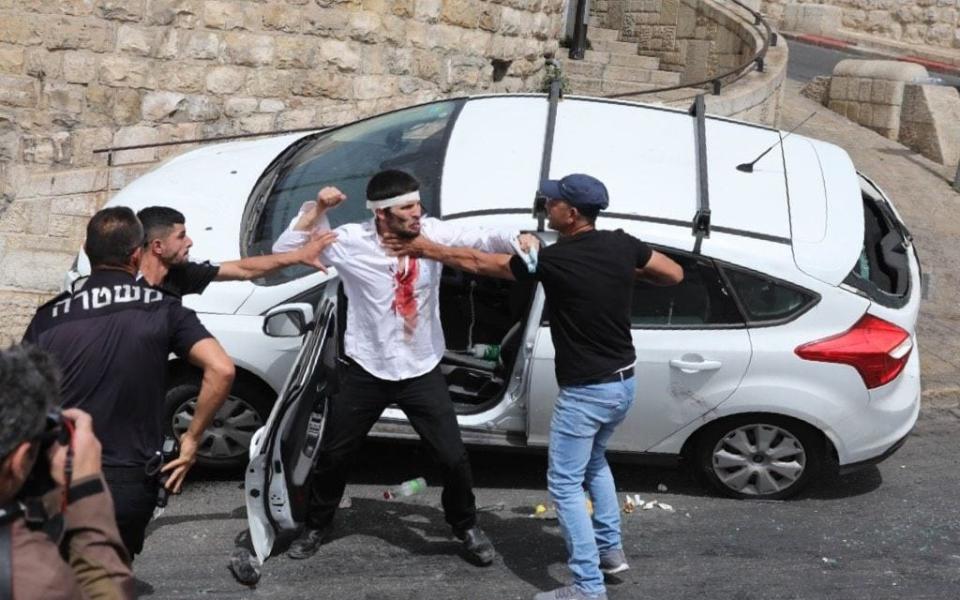
Around 6pm that night, Hamas, the militant Islamist group that controls the Gaza enclave, fired the first of a salvo of rockets into Jerusalem, minutes after the passing of a deadline it had issued for Israeli forces to withdraw from al-Aqsa and Sheikh Jarrah. The touchpaper was now alight, Israel was on the brink of war...

